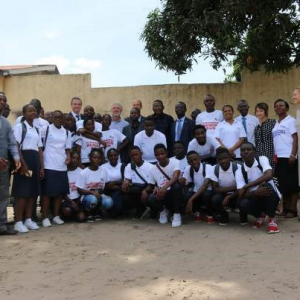
Participants in the Youth Clubs Against Violence (YCAV) project – developed by Living Peace Institute and Equimundo and funded by the Swedish Embassy in Kinshasa – were visited by a delegation comprising Peter Eriksson, Sweden’s Minister for International Development Cooperation, and the Swedish Ambassador to Kinshasa and his diplomatic corps.
The delegation traveled to the Mbongwana Aide à L’Enfance Defavorisée (AED) Center in Kinshasa, where they were welcomed by various YCAV project participants, including girls and boys, parents, center and school staff, and partners. During the time spent in Kinshasa, the Minister sat in on a club simulation session, listened to testimonials from participants, and visited the youth and vocational training centers.
The first part of the visit included a presentation of the project and its achievements by the YCAV Coordinator, after which the delegation observed sessions on two themes: “Gender and sex,” and “Understanding violence and the cycle of violence.” During these sessions, young people shared how ideas around sex and gender can serve to define expectations for men or women. The first presentation allowed the delegation to learn about young people’s understanding of and perspectives on gender and sex. One young man said:
“After attending the education sessions, we understood that between the man and the woman there are no differences [in ability] when it comes to doing the work either at home or elsewhere in society.”
As part of its work to disrupt cycles of violence, YCAV has been helping to provide alternative, nonviolent, and healthy solutions for young people. A young man who formerly belonged to a street gang, or Kuluna. described to the Minister how was he able to leave the street:
“I’ve been in gangs; every day, there was fighting between the young people of the two neighborhoods, and I was the general leader of the troops. What pushed me to join the gang was the death of my father. As a man, when I saw that I did not have the opportunity to face many of the challenges of life at home I decided to join the Kuluna, where I was the victim of serious injuries. But once I became part of the Youth Clubs Against Violence, I learned to manage my emotions, and I did not despair despite the vicissitudes of life. To end the violence, I quickly understood that I was wrong, and I left everything. I had even resumed my studies and I am a state graduate. I intend to continue my studies in order to become an electrical engineer.”
The Minister and his delegation also visited the AED Girls’ Housing Center as well as the vocational training center which hosts some of the young people who have participated in YCAV education sessions.

Paul Mburu, an independent consultant who carried out the impact evaluation and a socioeconomic study on the project, highlighted the relevance of the project in that it helps young people to develop positive perspectives on nonviolence, gender equality, and their own aspirations for the future. He has recommended to Sweden not only the continuation of the project but its extension to other communities in Kinshasa.
Similarly, at the end of his visit, the Minister expressed satisfaction with the results of the project, and promised to discuss with collaborators the possibility of its continuation.
The Youth Clubs Against Violence project is implemented in centers by AED, in schools by the National Coalition for Education for All (CONEPT), and collaborates on its advocacy aims with the Network of Educators of Street Children and Youth Educators (REEJER). It is currently being implemented in a pilot phase of four years in the communities of Kintambo, Bumbu, and Makala.

